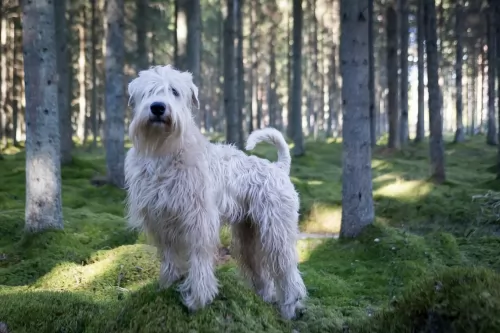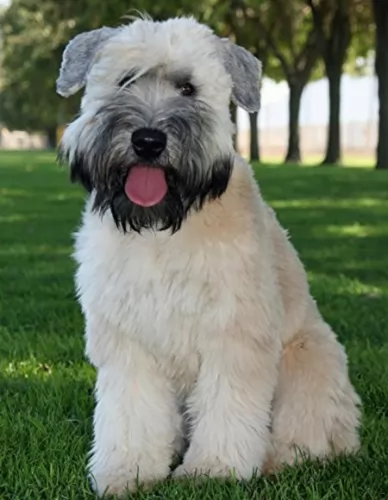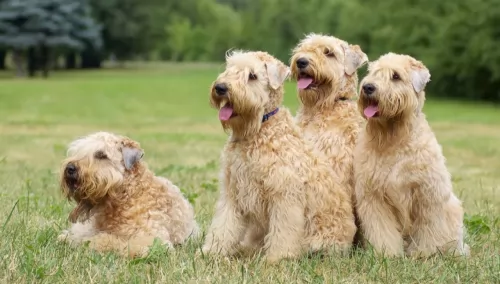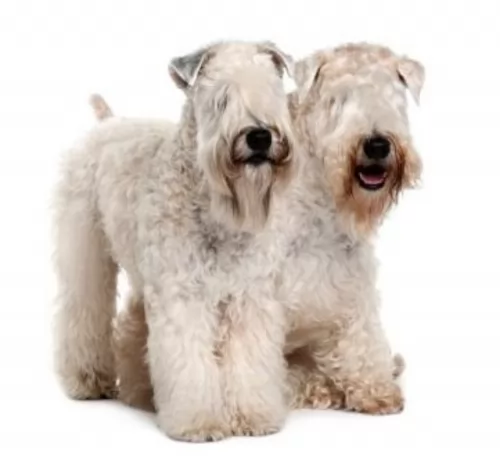 Petzlover
Petzlover Basset Hound is originated from France but Soft-Coated Wheaten Terrier is originated from United Kingdom. Basset Hound may grow 12 cm / 4 inches shorter than Soft-Coated Wheaten Terrier. Basset Hound may weigh 9 kg / 20 pounds more than Soft-Coated Wheaten Terrier. Basset Hound may live 3 years less than Soft-Coated Wheaten Terrier. Both Basset Hound and Soft-Coated Wheaten Terrier has same litter size. Both Basset Hound and Soft-Coated Wheaten Terrier requires Moderate Maintenance.
Basset Hound is originated from France but Soft-Coated Wheaten Terrier is originated from United Kingdom. Basset Hound may grow 12 cm / 4 inches shorter than Soft-Coated Wheaten Terrier. Basset Hound may weigh 9 kg / 20 pounds more than Soft-Coated Wheaten Terrier. Basset Hound may live 3 years less than Soft-Coated Wheaten Terrier. Both Basset Hound and Soft-Coated Wheaten Terrier has same litter size. Both Basset Hound and Soft-Coated Wheaten Terrier requires Moderate Maintenance.
 The Basset is a French dog bred in Great Britain in the late 1800s. The history of the Basset goes way back to ancient times as there have been discoveries of short legged dogs found in the catacombs of Egypt. These dogs also became popular during Emperor Napoleon III’s reign. Controlled breeding of the Basset began in France in 1870.
The Basset is a French dog bred in Great Britain in the late 1800s. The history of the Basset goes way back to ancient times as there have been discoveries of short legged dogs found in the catacombs of Egypt. These dogs also became popular during Emperor Napoleon III’s reign. Controlled breeding of the Basset began in France in 1870.
Hunting was popular with noblemen during the Middle Ages, and Francois Hubert bred hounds for this purpose. After his death, in his honor, the monks named the hounds bred at the monastery the St. Hubert's Hound. It is accepted that the St. Hubert's Hound is an early ancestor of many hound breeds that we see today.
French Bassets were imported into England in the 1870s. Everett Millais, thought to be the father of the modern Basset Hound, bred such dog to a Bloodhound to create a heavier Basset. The puppies were later refined with English- and French Bassets, and the first breed standard for the Basset Hound was made in the UK at the end of 19th century. To this day, many cartoon dogs are based on this extraordinary looking dog, and they also appear in adverts, a popular one being the logo for Hush Puppies, a shoe brand.
 This wheaten colored terrier hails from Ireland. Although the Wheaten has been around for a long time, it was in 1937 that he was recognized as a breed in Ireland.
This wheaten colored terrier hails from Ireland. Although the Wheaten has been around for a long time, it was in 1937 that he was recognized as a breed in Ireland.
The British Kennel Club also recognized the Wheaten and the dog was also exported to the United States. Serious interest started being shown for the Terrier in the 1970s. It was in 1973 that they were recognised by the American Kennel Club.
 The Basset Hound is a scent hound, a short-legged breed of dog belonging to the hound family. He is renowned for his long body, his loose skin and the very characteristic long, droopy, low-set ears. This is also a dog that drools a lot. The Basset Hound stands only 33 – 38 cm in height. You wouldn’t call him a small dog as he is robust and solid, weighing anything from 18 to 30kg. The Basset Hound is also well known for his eyes, where the red of the lower eyelid shows. Their calm, serious expression is also a familiar and much loved feature of these dogs.
The Basset Hound is a scent hound, a short-legged breed of dog belonging to the hound family. He is renowned for his long body, his loose skin and the very characteristic long, droopy, low-set ears. This is also a dog that drools a lot. The Basset Hound stands only 33 – 38 cm in height. You wouldn’t call him a small dog as he is robust and solid, weighing anything from 18 to 30kg. The Basset Hound is also well known for his eyes, where the red of the lower eyelid shows. Their calm, serious expression is also a familiar and much loved feature of these dogs.
The Basset is a short-haired dog, but in spite of that he sheds constantly. Coat colors can vary but the most common colors are white, tan and black – a tri-color coat.
This scent hound is a friendly canine, outgoing and playful. He gets on well with children and other pets in the family, and training and socialization can make him even more amicable with them. He adapts easily to life in the city or in the country.
 The Wheaten is a medium sized dog standing at between 43 and 50cm and weighing between 13 and 20kg both male and female. The coat of the dog is soft, silky and wavy to even curly and is a wheaten to ginger color.
The Wheaten is a medium sized dog standing at between 43 and 50cm and weighing between 13 and 20kg both male and female. The coat of the dog is soft, silky and wavy to even curly and is a wheaten to ginger color.
The coat of the puppy is dark but as he grows up it changes into the wheaten color although the ears may be a dark brown color. Pet owners like that the Wheaten is a very low shedding dog.
Playful, social and friendly, the Wheaten has always been put to good use on the farm. These days he is pet and companion. He is energetic and playful so children love having him around.
He is slightly more hyper and energetic than other Terrier breeds so will require a good dose of exercise.
He is smart and strong willed, and training and socialization turns him into an amicable pet to have around, so much so that he is sought after as a therapy-dog.
They’re easy-going dogs with no aggression issues but they still make great watch dogs and want to do whatever it takes to look after- and protect their human family.
 The Basset's long body with his short legs give him a unique look. Add to that this breed is among the most even-natured and easy-going. It is why he makes such a cool pet. While he adapts well to both city living and country living, you can’t afford to let him become a couch potato. Sitting around and eating consistently will just make your best friend sick and increase your medical bills for him.
The Basset's long body with his short legs give him a unique look. Add to that this breed is among the most even-natured and easy-going. It is why he makes such a cool pet. While he adapts well to both city living and country living, you can’t afford to let him become a couch potato. Sitting around and eating consistently will just make your best friend sick and increase your medical bills for him.
The amicable Basset Hound is child friendly and because he isn’t particularly territorial, he will be alright with your other pets too. If you're looking for a wonderful friend who will be loyal to you, the Basset is waiting to fill the role of companion for you.
 The Soft Coated Wheaten Terrier has always made an excellent farm dog, but today he is more suited as pet and companion.
The Soft Coated Wheaten Terrier has always made an excellent farm dog, but today he is more suited as pet and companion.
He adapts easily to life in the city or the countryside. Wherever he is, he will need his exercise. He also longs to be an active part of his human family, and then he’s happy, lively, social and friendly and is a great playmate for children.
 The Basset Hound is a pretty robust breed and with proper nutrition and exercise, can live up to 12 years of age but this particular breed is prone to some major health conditions.
The Basset Hound is a pretty robust breed and with proper nutrition and exercise, can live up to 12 years of age but this particular breed is prone to some major health conditions.
Cherry Eye is seen quite often in Basset Hounds. It is very painful because the tear gland tears away and it will require surgery before infection sets in. Also, glaucoma is an inherited eye disease that needs to be checked out as it can lead to blindness. The eye is red and the dog is constantly rubbing at it.
This is when the cartilage in the Basset’s joints don’t attach to the bone properly. It is known as osteochondritis dissecans or OCD. Be careful to stick to the recommended growth rate suggestions for feeding with a Basset puppy.
Basset Hounds are more prone to a heart condition known as dilated cardiomyopathy, or DCM. It is where the heart becomes large and weak so that it battles to pump blood to the body.
Other illnesses to look out for are Canine Hip Dysplasia and obesity.
 When you bring a Wheaten Terrier into your home, you’re not likely to have too many vet fees as he tends to be a healthy dog breed, being able to reach 13, 14 or 15 years of age with good care.
When you bring a Wheaten Terrier into your home, you’re not likely to have too many vet fees as he tends to be a healthy dog breed, being able to reach 13, 14 or 15 years of age with good care.
Look out for a dog ailment known as Protein-losing enteropathy (PLE). This is a condition where the dog isn’t able to properly absorb protein in the digestive tract, so that it is passed in their stools.
It can be fatal, but if caught early, some dietary changes can keep it under control.
Also, look out for inflammatory bowel disease. This disease occurs when the stomach of the dog has a large number of inflammatory cells which can change the lining of the digestive tract, preventing the normal absorption of food.
 Watching his diet. He will need quality, nutritious food and plenty of exercise.
Watching his diet. He will need quality, nutritious food and plenty of exercise.
It is also a good idea to get into the habit of brushing his teeth a couple of times a week with a special dog toothbrush and toothpaste. Never use toothpaste made for humans.
Clean his long ears and keep them dry. The vet will show you precisely how.
Be sure to see that he get his puppy vaccinations, and that you continue to give him vet check-ups when he shows signs of sickness.
He has low grooming needs but brush his coat twice a week to get rid of dull, loose hairs.
He is a smart, active dog with lots of energy so set aside time to have ball games with him and to get him out of the yard with walks.
 Brush your pet’s silky coat twice a week. Such a silky coat can get all tangled and matted. If you prefer, many people opt to rather have the Wheaten’s coat professionally clipped as then it is easier to handle. They like to have the hair clipped that hangs over the dog’s eyes.
Brush your pet’s silky coat twice a week. Such a silky coat can get all tangled and matted. If you prefer, many people opt to rather have the Wheaten’s coat professionally clipped as then it is easier to handle. They like to have the hair clipped that hangs over the dog’s eyes.
Other grooming tasks require you to check inside his ears for redness which could indicate an infection. Trim his nails and check him over for ticks and fleas.
Have your Wheatie trained and socialized as he is a stubborn dog breed and you want him to be well mannered and obedient.
Terriers like this are energetic dogs and he is going to need exercise every day. A walk for a dog is always a welcome experience as it gives him the opportunity to sniff around and pick up new smells. Play ball- or frisbee games with him as this can tire him out a bit.
If your dog shows signs of illness, get him to the vet. He is such a feisty dog that it can be unbearable to see him out of sorts.
Terriers are energetic dogs so if you feed your dog one of the commercial dog foods, make sure the label indicates what food it is. This is because the foods are manufactured according to the type of dog it is, its age, size and energy levels.
Always try and go for the high quality foods which don’t have all those unhealthy ingredients in them. Try to include some home-made food – nothing exotic and spicy – just plain, wholesome food that won’t upset his stomach.
Boiled chicken, brown rice or pasta and spinach, sweet potatoes and carrots is super tasty and nutritious. You can chop it up and add it to your pet’s kibble twice a week.
Try and include a little bit of raw meat to his diet occasionally as this can go towards ensuring he doesn’t get skin diseases. Always ensure he has a constant supply of fresh, cool water available.